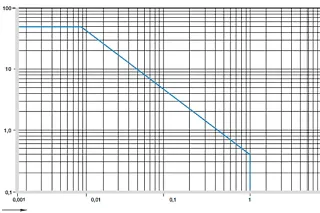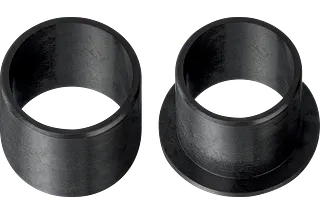Change Language :
iglidur® P - material data
The most important specifications at a glance
Due to thermal stability and low total moisture absorption, the iglidur P plain bearings are among the most dimensionally strong all-round bearings under varying environmental conditions. iglidur P plain bearings are recommended for pivoting and rotational movements at average loads.
| Descriptive technical specifications | ||
|---|---|---|
| Wear resistance at +23°C | - 🟧 🟧 🟧 ⬜️ ⬜️ + | More information on wear resistance |
| Wear resistance at +90°C | - 🟧 🟧 🟧 ⬜️ ⬜️ + | |
| Wear resistance at +150°C | - 🟧 ⬜️ ⬜️ ⬜️ ⬜️ + | |
| Sliding properties | - 🟧 🟧 🟧 🟧 ⬜️ + | Coefficient of friction, dynamic, against steel: 0.06 - 0.21µ |
| Wear resistance under water | - 🟧 🟧 🟧 ⬜️ ⬜️ + | |
| Media resistance | - 🟧 🟧 🟧 ⬜️ ⬜️ + | More information on media resistance |
| Resistant to edge pressures | - 🟧 🟧 🟧 🟧 ⬜️ + | |
| Resistant to shock and impact loads | - 🟧 🟧 🟧 🟧 ⬜️ + | |
| Dirt resistance | - 🟧 🟧 🟧 🟧 ⬜️ + |
Temperatures
Even with its highest long-term application temperature of +130°C, iglidur P does not quite reach the values of iglidur G. The temperatures prevailing in the bearing system also have an influence on bearing wear. Rising temperatures mean higher wear.
| min. application temperature | Upper application temperature, long-term | Upper application temperature, short-term | In addition secure axially from |
|---|---|---|---|
| -40°C | +130°C | +200°C | +90°C |
Permissible surface speeds
Plain bearings from iglidur P are maintenance-free plain bearings that have been developed for low to medium sliding speeds. The maximum values given in the table can only be achieved at very low surface pressures. The specified maximum speed is the speed at which friction can lead to an increase up to the permanently permissible temperature.
Surface speeds of various iglidur materials
| Maximum surface speeds [m/s] | Rotating | Oscillating | linear |
|---|---|---|---|
| permanent | 1.0 | 0.7 | 3.0 |
| Short-term | 2.0 | 1.4 | 4.0 |
Permissible p x v values

Diagram 01: Permitted pv values for iglidur P plain bearing with 1mm wall thickness in dry operation against a steel shaft, at +20°C, installed in a steel housing
X = surface speed [m/s]
Y = pressure [MPa]
iglidur P plain bearing provides the user with cost-effective, maintenance-free plain bearings. Compared to iglidur G, plain bearings made from iglidur P are more suitable for rotating movements and high loads.
pv value, max. (dry): 0.39 [MPa · m/s]
Mechanical specifications
The maximum recommended surface pressure is a mechanical material parameter. Conclusions about the tribology cannot be drawn from this. The compressive strength of iglidur P plain bearings decreases with increasing temperatures. Diagram 02 illustrates this relationship. Diagram 03 shows the elastic deformation of iglidur P under radial loads. Under the maximum recommended surface pressure of 50MPa, the deformation is less than 4%.
Friction and wear
The coefficient of friction decreases with increasing load, as does the wear resistance (diagrams 04 and 05). iglidur P plain bearings reach a pronounced minimum coefficient of friction for shafts with a surface finish of 0.1 to 0.2μm. Both smoother and rougher shafts cause the friction to increase significantly.
Coefficients of friction for iglidur P against steel (Ra = 1µm, 50HRC):
| iglidur P | dry | Greases | Oil | Water |
|---|---|---|---|---|
| Coefficient of friction μ | 0.06 - 0.21 | 0.09 | 0.04 | 0.04 |
Shaft materials
Diagram 06 shows results of testing different shaft materials with plain bearings made from iglidur P. With rotating movements, the wear of iglidur P with Cf53 and HR carbon steel shafts is very low. In contrast, the bearings are worn out more heavily even in the lower load range, especially with hard chrome-plated shafts, than with other shaft materials. At a load of 2MPa, for example, Cf53 is six times superior to 304 SS. On the other hand, the "soft" HR carbon steel shaft is significantly less favourable than the hardened shaft materials or even 304 SS shafts during pivoting movements.
Installation tolerances
iglidur P plain bearings are standard bearings for shafts with h-tolerance (recommended minimum h9). The bearings are designed for press-fit into a housing machined to a H7 tolerance. After installation in a housing with nominal dimensions, the inner diameter of the bearing with E10 tolerance adjusts itself automatically. For certain dimensions, the tolerance deviates depending on the wall thickness (see product range).
Important tolerances according to ISO 3547-1 after the press-fit:
| Diameter d1 [mm] | Housing H7 [mm] | iglidur P plain bearing E10 [mm] | Shaft h9 [mm] |
|---|---|---|---|
| up to 3 | +0.000 +0.010 | +0.014 +0.054 | -0.025 +0.000 |
| > 3 up to 6 | +0.000 +0.012 | +0.020 +0.068 | -0.030 +0.000 |
| > 6 up to 10 | +0.000 +0.015 | +0.025 +0.083 | -0.036 +0.000 |
| > 10 up to 18 | +0.000 +0.018 | +0.032 +0.102 | -0.043 +0.000 |
| > 18 up to 30 | +0.000 +0.021 | +0.040 +0.124 | -0.052 +0.000 |
| > 30 up to 50 | +0.000 +0.025 | +0.050 +0.150 | -0.062 +0.000 |
| >50 to 80 | +0.000 +0.030 | +0.060 +0.180 | -0.074 +0.000 |
| >80 to 120 | +0.000 +0.035 | +0.072 +0.212 | -0.087 +0.000 |
| > 120 up to 180 | +0.000 +0.040 | +0.085 +0.245 | -0.100 +0.000 |
Moisture absorption
Chemical resistance
iglidur P plain bearings have good resistance to chemicals. They are resistant to most lubricants. Most weak organic and inorganic acids do not attack iglidur P.
All data at room temperature [+20 °C], + resistant 0 conditionally resistant - non-resistant
| Medium | Resistance |
|---|---|
| Alcohols | + |
| Greases, oils without additives | + |
| Hydrocarbons | - |
| Fuels | + |
| Strong alkalines | - |
| Strong acids | - |
| Diluted alkalines | - |
| Diluted acids | 0 |

Buy iglidur P products in the online shop
- Large selection of moulds and materials
- Available within 24 hours
- No minimum order value
- No minimum order quantity
Typical application areas
ASI Automatikk AS Distributor+47 9006 1100










